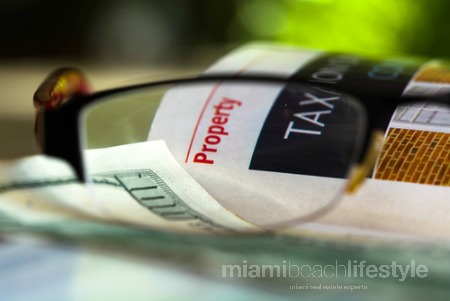Facts About Miami Property Taxes
January 20, 2017Buying a house – for yourself, or as an investment property, is an exciting experience, but the experience can be stressful if you aren’t prepared. There are appraisals, inspections, and legal considerations. Let’s not forget that once you own a home, you can expect a visit from Uncle Sam.
 What Can I Expect to Pay in Taxes?
What Can I Expect to Pay in Taxes?
When you purchase a home in Florida, you can expect to pay approximately 2-percent of the property’s assessed value in taxes. You should keep in mind that the assessed value of a property is an estimated 20-percent less than the selling price. Let’s look at what this means if you purchase a home that sells for $450,000.
Per the suggested formula, the assessed value of the $450,000 home is $360,000. We get this amount by subtracting 20-percent, or $90,000, from the selling price of the property. Two percent of the assessed value of $360,000 is $7,200. Use this formula to get a foundation idea of the taxes you can expect to pay for a Florida property.
How Can I Save Money on Property Taxes in Florida?
One of Florida’s most unique exemptions is for having a homestead. A homestead is your primary place of residence. You can claim this tax exemption on one property in Florida that is not a rental property, business, or vacation home. You must be a resident of Florida and not have a primary residence in another state.
One homestead exemption is allowed per married couple, and the exemption is not transferable with a sold property. So, if the property you purchase was a homestead, you still need to manage new paperwork to claim that status for the home under your ownership.
Certain historic properties receiving repairs or renovations may also qualify for exemptions. There are discounts for unmarried or recent widowers, active military members on deployment, disabled veterans, and disabled persons.
 Property Tax Basics
Property Tax Basics
Property tax, also known as a millage tax, is a levy by the governing authorities applied to the owned property within that authority’s jurisdiction. Such governing authorities may include but are not limited to the city, county and school district.
Property taxes apply to the entire nation, although tax rates may vary depending upon location. If you own a property in the United States – be it a vacant lot, single family home, multifamily townhouse, Miami Beach condo, South Beach community property, or Belle Isle home – you are required to pay property tax. These taxes are used to support local agencies operating within the area.
Remember that homestead exemption we mentioned earlier? It’s important to keep in mind that a seller’s assessed value may look lower than normal due to the Save Our Homes limitation associated with this exemption. When the property is purchased, market value is determined for the coming tax year. So, don’t be surprised if this increases the taxes.
Additional Examples
Here are a couple of examples to help illustrate tax calculations. Keep in mind that these are only examples and are not meant to be used for actual planning.
The selling price of this Miami Beach condo is $500,000. The assessment value is $400,000. Subtract the homestead exemption of $25,000, and your new taxable total is $375,000. Let’s say that the property tax rate is 2%. That’s an estimated tax of $7,500 or $625 per month.
The selling price of this South Beach property is $1,225,000. The assessment value is $980,000. Subtract the homestead exemption of $25,000, and your new taxable total is $955,000. With a property tax at 2%, the estimated tax is $19,100 or $1,592 per month.
Let’s look at this same property without the homestead exemption. The assessment value is $980,000 with a property tax of 2%. Your estimated tax is $19,600 or $1,633 per month.
The Bottom Line
When you purchase a property in the United States, you’re going to pay property tax. Property taxes are based on the current value of your home, determined by the current real estate market. When you pay property taxes, you’re supporting the public resources in the community in which you live, or in which your property is located. You may qualify for property tax exemptions, but must apply for those exemptions, providing proof of your qualifications. The more expensive the property, the higher the property taxes.
For more information on property taxes in Miami-Dade County, including a property tax calculator, visit here.
Your best source for real estate and community information is your real estate agent. Contact Juan Leal at 305-982-7405 to learn more about local neighborhoods, discuss selling your house, or tour available homes in Miami and surrounding areas.






